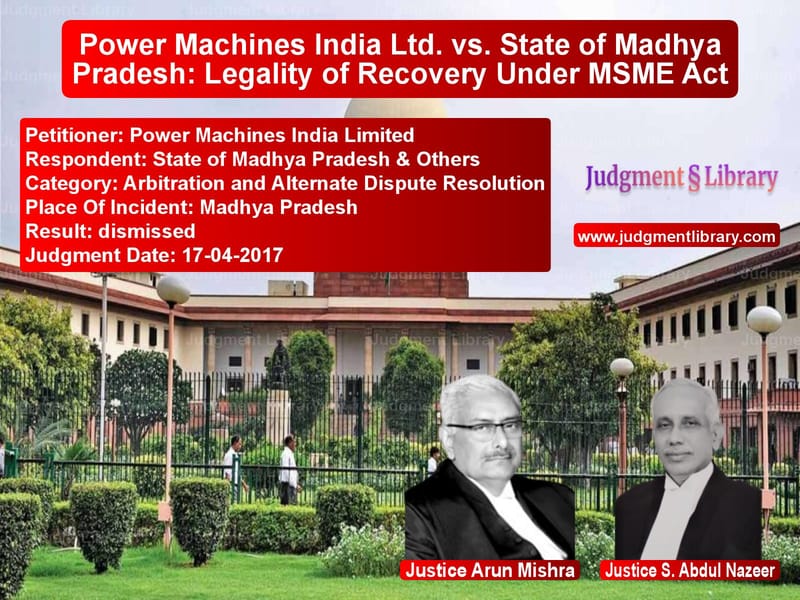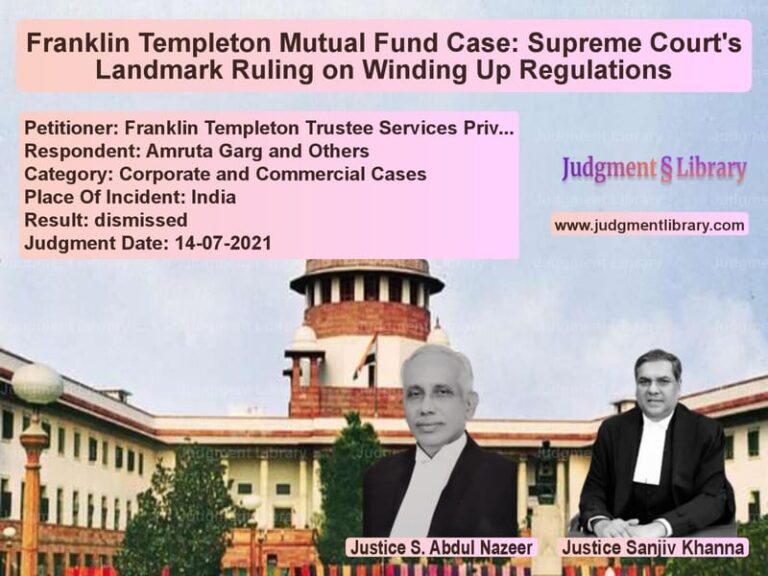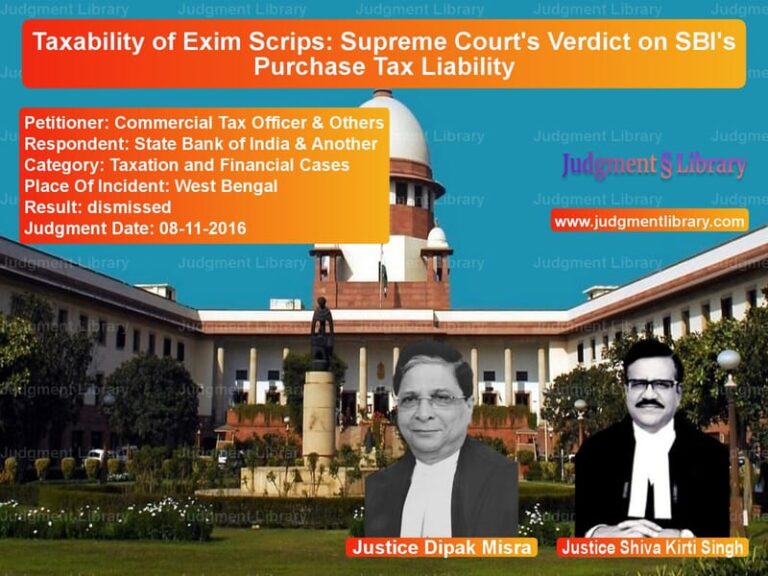Power Machines India Ltd. vs. State of Madhya Pradesh: Legality of Recovery Under MSME Act
The case of Power Machines India Ltd. vs. State of Madhya Pradesh is a significant judgment related to the recovery of dues under the Micro, Small, and Medium Enterprises Development Act, 2006 (MSME Act). The Supreme Court examined whether Rule 5 of the Madhya Pradesh Micro and Small Enterprises Facilitation Council Rules, 2006, which allowed recovery of awarded amounts as arrears of land revenue, was legally valid.
The dispute arose when Power Machines India Ltd. was directed to pay Rs. 1,15,77,630 plus interest under an arbitration award to Lakshmi Engineering Industries (Bhopal) Pvt. Ltd. The Madhya Pradesh Facilitation Council issued recovery notices under Rule 5 of the state rules, treating the unpaid award as arrears of land revenue.
Legal Issues
- Whether Rule 5 of the Madhya Pradesh MSME Facilitation Council Rules was ultra vires to the parent MSME Act, 2006.
- Whether recovery of dues under MSME awards should follow the process outlined in the Arbitration and Conciliation Act, 1996.
- Whether the rule violated the fundamental rights of the appellant under Article 14 of the Constitution of India.
Arguments by the Petitioner (Power Machines India Ltd.)
- The company contended that Rule 5 was arbitrary and violated Article 14 as it created an additional mechanism for recovery that was harsher than the normal civil procedure.
- Under Section 36 of the Arbitration and Conciliation Act, 1996, an award can be executed as a decree under the Code of Civil Procedure (CPC), which provides safeguards such as the ability to stay execution and file objections.
- Allowing recovery as arrears of land revenue bypassed these safeguards and treated the petitioner unfairly.
- Only four states—Madhya Pradesh, West Bengal, Punjab & Haryana, and Andhra Pradesh—had such provisions, creating an unequal treatment of businesses across the country.
Arguments by the Respondents (State of Madhya Pradesh)
- The state defended Rule 5 as a necessary mechanism to ensure quick enforcement of arbitration awards in favor of micro and small enterprises.
- The MSME Act aims to protect small businesses from delays in payments, and the recovery mechanism was designed to provide an expeditious remedy.
- The provision was valid under Section 30 of the MSME Act, which allowed state governments to frame rules for implementation.
- Providing multiple recovery options was legally permissible, and the award holder had the right to choose between them.
Supreme Court’s Judgment
The bench comprising Justices Arun Mishra and S. Abdul Nazeer upheld the validity of Rule 5 and dismissed the appeal. The Court ruled:
- Providing multiple avenues for recovery does not create repugnancy or arbitrariness. The award holder can elect the remedy best suited for their needs.
- The MSME Act aims to promote small businesses by ensuring timely payments, and the recovery mechanism is consistent with this objective.
- There is no inherent contradiction between the provisions of the MSME Act and the Arbitration and Conciliation Act, as both are aimed at executing arbitration awards.
- Rule 5 is a valid rule made under Section 30 of the MSME Act and does not violate any fundamental rights of businesses.
- The argument that only certain states have such provisions does not make them unconstitutional, as state governments are empowered to make rules as required.
Key Excerpts from the Judgment
The Supreme Court observed:
“Providing a speedy recovery mechanism is in line with the objective of the MSME Act. The remedy provided under Rule 5 does not deprive the judgment debtor of any legal rights but rather expedites the execution process.”
Regarding multiple recovery mechanisms, the Court held:
“The validity of plural remedies cannot be doubted. Even if two remedies happen to be inconsistent, they remain available until the award holder elects one.”
On allegations of arbitrariness, the Court noted:
“The provision of recovery outrightly, without recourse to the Civil Court, is justified in ensuring the enforcement of arbitral awards in favor of small enterprises. No prejudice is caused to the judgment debtor.”
Implications of the Judgment
- Businesses dealing with MSMEs should be aware that arbitration awards in favor of small enterprises can be recovered as land revenue in some states.
- State governments have flexibility in determining how MSME awards are enforced, and similar rules could be adopted in other states.
- The judgment reinforces the government’s commitment to protecting small enterprises and ensuring they receive payments on time.
Conclusion
The Supreme Court’s ruling in Power Machines India Ltd. vs. State of Madhya Pradesh upholds the legitimacy of expedited recovery procedures for MSMEs. By allowing recovery as arrears of land revenue, the ruling ensures that small enterprises do not face undue delays in recovering dues from larger corporations. The decision serves as a precedent for the enforceability of MSME arbitration awards and reinforces the objective of protecting small businesses.
Don’t miss out on the full details! Download the complete judgment in PDF format below and gain valuable insights instantly!
Download Judgment: Power Machines India vs State of Madhya Prad Supreme Court of India Judgment Dated 17-04-2017.pdf
Direct Downlaod Judgment: Direct downlaod this Judgment
See all petitions in Arbitration Act
See all petitions in Enforcement of Awards
See all petitions in Dispute Resolution Mechanisms
See all petitions in Judgment by Arun Mishra
See all petitions in Judgment by S. Abdul Nazeer
See all petitions in dismissed
See all petitions in supreme court of India judgments April 2017
See all petitions in 2017 judgments
See all posts in Arbitration and Alternate Dispute Resolution Category
See all allowed petitions in Arbitration and Alternate Dispute Resolution Category
See all Dismissed petitions in Arbitration and Alternate Dispute Resolution Category
See all partially allowed petitions in Arbitration and Alternate Dispute Resolution Category







